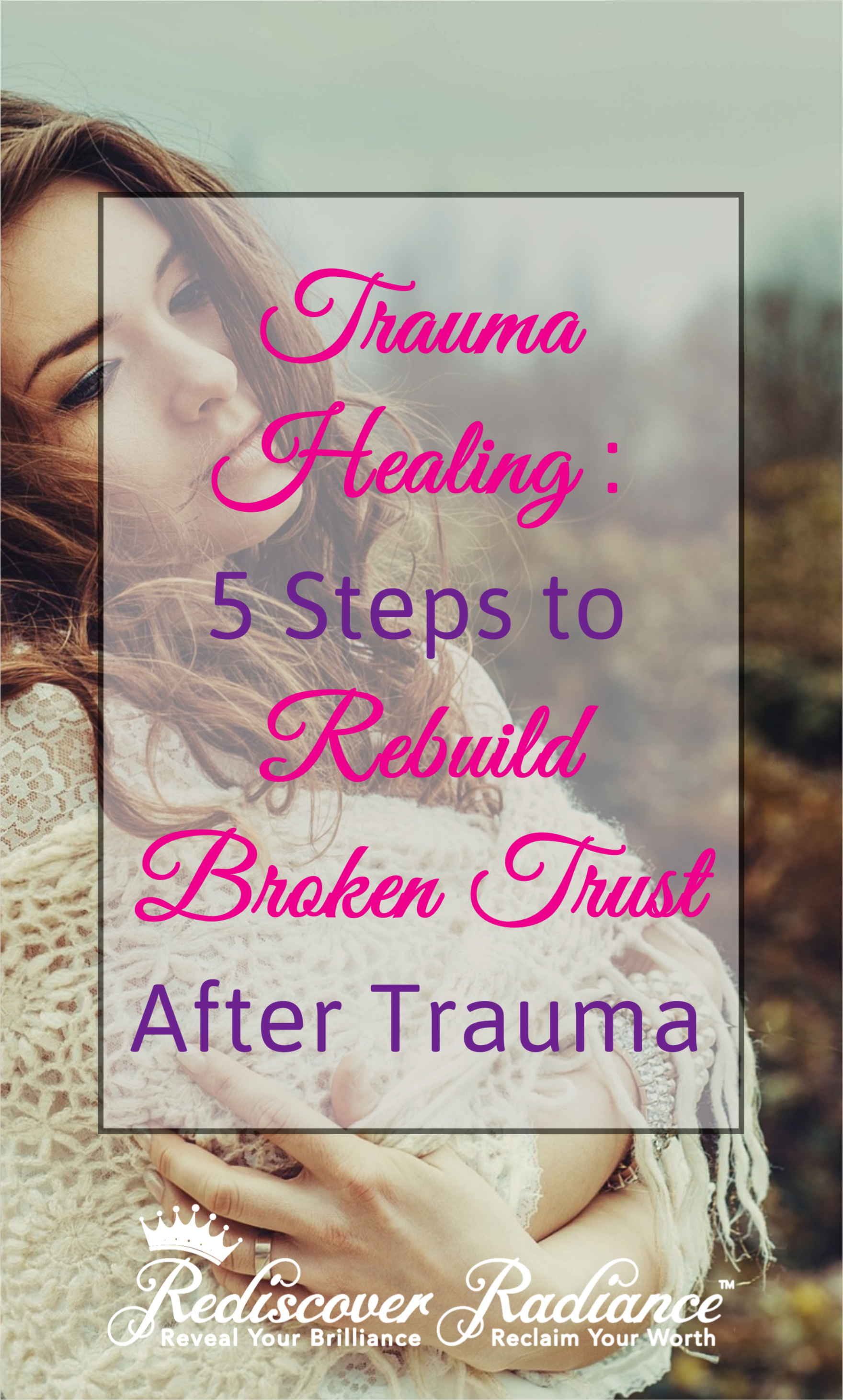My clients often ask me how to rebuild trust after trauma. It’s an important question. After all, they’ve been betrayed – often in a very significant way, and by the people they were “supposed” to trust the most.
But trust is tricky. We want people to trust us. And we’re often offended when don’t. Yet at the same time, broken trust is one of the most soul-wrenching things to overcome – especially when it comes to trauma healing.
If you need to rebuild trust after trauma, you are not alone. Read on and discover 5 Steps to Rebuild Trust After Trauma.
Lessons about Trust
 I always disliked driving on windy, mountain roads, and recently I navigated them not once, but twice. Once, north of Boise, Idaho, I drove on a narrow, two-lane highway next to a raging whitewater river with no guardrail. Despite some fear and trepidation on my part, I completed that trip unscathed. And turned my fear into confidence. (Read that lesson here.)
I always disliked driving on windy, mountain roads, and recently I navigated them not once, but twice. Once, north of Boise, Idaho, I drove on a narrow, two-lane highway next to a raging whitewater river with no guardrail. Despite some fear and trepidation on my part, I completed that trip unscathed. And turned my fear into confidence. (Read that lesson here.)
The second time, north of Sedona, Arizona, I wasn’t so lucky. Heavy rains loosened the rocks on the mountain above. They tumbled down the mountain side and landed right in front of our car, ripping up the undercarriage, destroying the drain pan, and disabling our car. (Read the whole story, and the gratitude lessons I learned from it here and here.)
Both experiences taught me about trust.
How Trauma Destroys Trust
Basically, we go through life trusting that it’s fairly predictable. We trust that, on the other side of that blind curve, there isn’t a car stopped in the middle of the road, just around that tight curve which we can’t see past. And we trust that the oncoming car will stay in its narrow lane and not cross over into our own.
We trust Life all the time. And most times, our trust is well-founded.
 But sometimes, the driver does veer into your lane. Sometimes, the rocks to slide down on your vehicle. Sometimes, someone hurts you so badly that it shakes your fundamental trust in the way Life works.
But sometimes, the driver does veer into your lane. Sometimes, the rocks to slide down on your vehicle. Sometimes, someone hurts you so badly that it shakes your fundamental trust in the way Life works.
When you experience trauma, you experience a profound loss of trust. That person does not act rationally. They don’t play by the rules. We can’t trust that they’ll stay in their lane because they’ve proven that they won’t. And with ongoing trauma, they prove it over and over again, like a drunken driver who repeatedly swerves into oncoming traffic.
So when life itself appears unpredictable due to trauma, how do you move on? How do you rebuild trust after trauma?
You start by regaining trust in yourself. The following 5 Steps to Rebuild Trust After Trauma show you how.
5 Steps to Regain Trust After Trauma

1) Remove yourself from toxic situations.
Have you ever picked at a scab until it became a scar? You didn’t give it the time and space to heal. A wound cannot heal when you poke at it every single day.
In trauma healing, you need distance – be it physical, emotional, or both. So it’s perfectly OK to remove yourself from toxic situations and relationships for the sake of your own mental health and trauma healing. Sometimes, it’s only temporary. Sometimes, it must be forever. It depends on the situation.
Here’s an important truth about how to rebuild trust after trauma: Trust must be earned, not given. And that starts with boundaries, not blind trust. (Read: Why Setting Boundaries is Hard for Women)

For more information on healthy boundaries, read Boundaries, by Dr. Henry Cloud and Dr. John Townsend
2) Replace self-defeating, self-accusing thoughts with thoughts of grace.
Replace self-defeating, self-accusing thoughts with thoughts of grace.
- “How did I let myself get here?”
- “Why didn’t I leave the first time?”
- “How did I not see what was happening?”
These thoughts are common but ultimately fruitless. Replace such self-defeating thoughts with this realization: “I did the best I could at the time, with the knowledge and resources I had.” Develop the habit of talking nicely to yourself.
To rebuild trust after trauma, you must learn to trust yourself first. Give yourself grace. Give yourself the benefit of the doubt. Give yourself the gift of acknowledging that you’re doing the best you can.
3) Forgive.
They say that lack of forgiveness is like drinking poison and expecting the other person to die.
Forgiveness doesn’t depend on the other person apologizing or even acknowledging their wrongs. They don’t even have to know you’ve forgiven them. Forgiveness isn’t for them. It’s for you – especially you’re trying to rebuild trust after trauma. You can’t rebuild trust when you’re constantly stewing in the pain.

Forgiveness is for YOU. So you can move forward and begin to heal. So you don’t keep poking at your own wounds by revisiting it nonstop.
While you’re at it, forgive yourself, too. Forgive yourself for not knowing any better (see #2). And forgive yourself for knowing better and doing it anyway.
Need help learning to forgive? (Don’t we all!) Download my free Radiant Life™ Forgiveness Template, and learn the powerful step-by-step formula to say goodbye to bitterness, find freedom through forgiveness, and make peace with your past.
4) Rebuild your trust in yourself by keeping commitments to yourself.
You can’t force other people to act in a trustworthy manner. But you can hold yourself to that standard. To rebuild trust after trauma, you must prove to yourself that YOU are trustworthy. Prove it by keeping commitments to yourself.
 In the beginning, your “commitments” can be as simple as:
In the beginning, your “commitments” can be as simple as:
- Get out of bed
- Brush teeth
- Eat breakfast
It doesn’t matter how easy they are; it matters that you do them. Keeping commitments to yourself sends a very powerful message that you are dependable and trustworthy. You can be trusted to keep your word to yourself. You can be trusted to enforce your boundaries. You can be trusted to keep yourself safe.
(AND, you are just as WORTHY as anyone else of being treated with integrity.)
5) Act in ways that are good for you.
Make healthy choices (physically, emotionally, and spiritually). Then develop those choices into daily habits.
Practice small, incremental changes so you don’t get overwhelmed and quit.
Also, make sure your choices are things you WANT to do, not things you think you SHOULD do. Guilt is NOT a healthy choice.
To rebuild trust after trauma, you must honor YOU and YOUR needs.
Remember, whatever you choose, keep that commitment to yourself (see #4). It’s OK – and actually, BETTER – to start small.
When you make healthy choices, you tell yourself that you are WORTHY of self-respect. Worthy of self-love. Worthy of being treated well. After all, how can you expect others to treat you as worthy if you don’t treat yourself that way?
Consistency Counts
Practice these five steps consistently. Because, over time, you’ll prove to yourself that you can be trusted to act in your own self-interest. That you will always have your own back. That you can trust yourself. And that, my dear, is how you begin to rebuild trust after trauma.
Do you know another way to rebuild trust in yourself? Share your tips in the comments below!
And remember to download the FREE Radiant Life™ Forgiveness Template to learn the powerful step-by-step formula to say goodbye to bitterness, find freedom through forgiveness, and make peace with your past.

